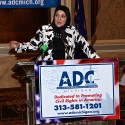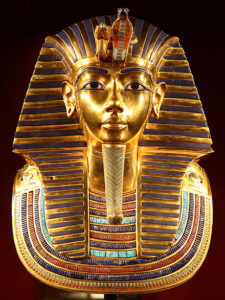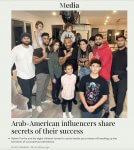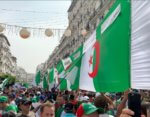ADC head walks fine line to make Michigan chapter effective. Fatina Abdrabboh might be the one person who can navigate successful among the many diverse and conflicting voices and interests in the widely divided American Arab community to achieve the primary goal in America, to stand up for the civil rights of Arabs and Muslims. But it won’t be easy.
By Ray Hanania
Michigan Attorney Fatina Abdrabboh is caught between a rock and a hard place as she continues to lead ADC’s largest chapter in the country to continue its fight against racism, discrimination as she navigates through a sea of continued turmoil in the American Arab community.
Abdrabboh took over the helm of the Michigan Chapter in November 2013 following the forced resignation of Imad Hamad, the long time civil rights champion accused of sexual harassment years before. He was a part of a widespread campaign driven by a handful of extremists who sought to destroy ADC (American Arab Anti-Discrimination Committee).
But Abdrabboh has kept that from happening and she has worked hard to make the ADC Michigan Chapter continue its work as a champion of civil rights and bridge-building with mainstream American leaders in almost every profession. That’s not an easy thing for an American Arab to achieve.
In an email to ADC Michigan members, and posted on its Facebook Page, Abdrabboh vowed to continue to champion the ADC’s foundation mission, to fight discrimination and to raise American understanding of the rights of American Arabs.
“As you all know, when I began as ADC-Michigan Director less than 3 years ago, the organization was at an all time low. Many of the most esteemed members of this community urged me to weigh very carefully the consequences of aligning my personal and professional credibility with an organization with such a damaged record. In response to the rampant mistrust of the ADC that existed before I took over, the first steps I initiated in Michigan were integrating institutional accountability, transparency, and creating an overall culture that respects women and is responsive to the evolving needs of our community,” Abdrabboh wrote in her public email.
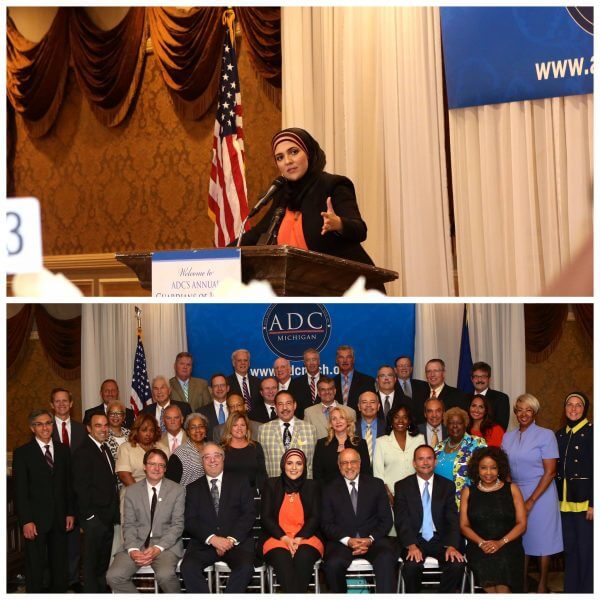
“Notwithstanding the advances we have made together as a community in Michigan, many of you have continued to contact me with complaints about ADC national’s board and leadership, which, in your words, is “disconnected from its grassroots,” “lacks transparency,” and “has failed in its responsibility to its members.” Some of you have lamented the ADC national leadership’s “continued failure to reflect the needs of its constituents,” and their “unwillingness to rectify and redress historic and ongoing grievances” including in the area of mistreatment and exclusion of women.”
Abdrabboh has a tough challenge in her capable hands trying to navigate through the turmoil in the American Arab community.
ADC’s troubles began over a dispute that involved the performance of a song by acclaimed Syrian musician Malek Jandali at the ADC Convention in 2011. ADC Chairman Safa Rifka had reportedly urged Jandali to drop the song from his performance because some interpreted it as being anti-Assad.
Jandali and ADC eventually worked out their differences but the protests against ADC, one of the few truly grass-roots American Arab organizations, evolved and continued including through today as the organization hosts it’s 36th annual convention in Washington D.C. this week. (See footnote below.)
=============================
The problem with the American Arab community has always
been that it is more successful at bullying its own community
members than fighting for Palestinian and Arab rights in American politics.
The extremist activists are vicious and hateful. They bully moderate American Arabs
with name calling and threats and their only goal is to suppress moderate voices.
But they are incapable of achieving any successes in achieving
any victories for the Palestinian people who continue to suffer
because of this American Arab dysfunction.
=============================
Like all conflicts in the Arab World, the ADC protest quickly evolved and embraced a new agenda.
The American Arab community is divided into two groups. The first is a group of activists who are very influential in Detroit who support Assad, Hezbollah, and Iran. They actively oppose the growing Saudi influence and the trend of Gulf nations softening their opposition to Israel, which is the real benefactor in the spread of violence and disruption throughout the Arab World and Middle East region, (Syria, Yemen, Iraq, Iran, Egypt, and even in Jordan). This group believes that Syria, Hezbollah and Iran may be the last vangaurd against Israeli hegemony in the region.
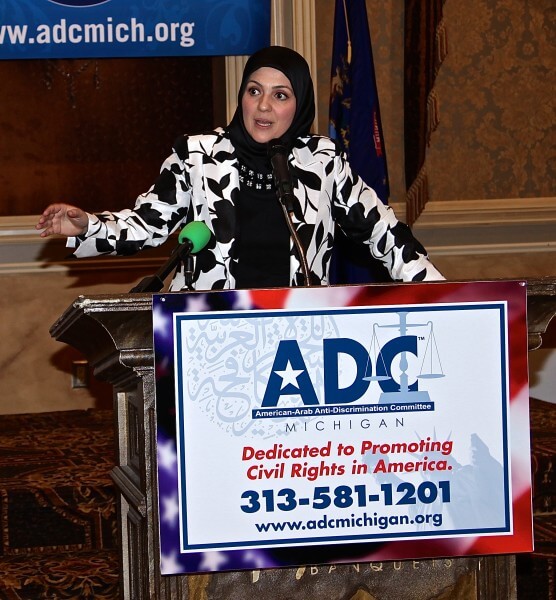
On the other side are American Arabs who support compromise with Israel and specifically the Two-State solution and who oppose Assad, Hezbollah and Iran. Many in this group blame most of the violence on Assad’s desperate attempt to preserve his dictatorship.
Hezbollah has a strong presence in Michigan and the ADC protest movement was quickly hijacked, targeting anyone who criticized the Assad regime in the escalating civil war against rebel forces. Since then, the conflict has become even more precarious as a third faction led by al-Qaeda affiliated terrorists, through Daesh (ISIS, the Islamic State), has targeted both the rebels and the Assad regime.
Syria is in a typical and unsolvable Arab World mess that seems unresolvable.
As the protests seemed to dissipate, a small movement of protestors based in Michigan have escalated their attacks against ADC National and have pressured the Michigan Chapter, Abdrabboh candidly acknowledged, prompting her to release her statement.
Here is the full statement issued by ADC Michigan Director Fatina Abdrabboh.
In response to your concerns: a letter of solidarity & service
Dear ADC Michigan Community,
I write to you today with full respect for the requests you have made regarding what you describe as the ADC national board and national leadership’s “failure to adequately respond to major concerns” you have raised recently. I also respect your concerns regarding what you have described as “the broken connection to the grassroots base” and the need to “change structures enabling mistreatment and exclusion of women.”
As you all know, when I began as ADC-Michigan Director less than 3 years ago, the organization was at an all time low. Many of the most esteemed members of this community urged me to weigh very carefully the consequences of aligning my personal and professional credibility with an organization with such a damaged record. In response to the rampant mistrust of the ADC that existed before I took over, the first steps I initiated in Michigan were integrating institutional accountability, transparency, and creating an overall culture that respects women and is responsive to the evolving needs of our community.
Despite these challenges, the ADC in Michigan has been incredibly effective and successful. As a result of your support and commitment, we have grown in impact, succeeded in our re-imaging, and have been at the forefront of defending our community’s civil rights. The feedback about the programming and outreach of the ADC-Michigan office has been met with great enthusiasm, encouragement, and support. Under my leadership, we have succeeded to transform ADC-Michigan into an effective, credible civil rights organization well-equipped to defend our community against bigotry and hate.
Notwithstanding the advances we have made together as a community in Michigan, many of you have continued to contact me with complaints about ADC national’s board and leadership, which, in your words, is “disconnected from its grassroots,” “lacks transparency,” and “has failed in its responsibility to its members.” Some of you have lamented the ADC national leadership’s “continued failure to reflect the needs of its constituents,” and their “unwillingness to rectify and redress historic and ongoing grievances” including in the area of mistreatment and exclusion of women.
You have also raised concern for what you describe as, “the troubling process” with which national board elections occur. Specifically, you described the ADC national board elections as “nothing more than window dressing moves” designed to create an illusion of compliance with external criticisms and community concerns. Some of you have contacted me urging that change in the culture and character of the national office will not occur by such elections and, thus, will have no impact on ADC national’s “management practices or enable the corrective actions needed to change the national office’s structure and culture of exclusion.”
In fact, because of your ongoing discontent many of you have shown your willingness to support only the ADC Michigan under my leadership, excluding the national office from any support.
I believe very strongly that in light of the broken trust you feel towards the ADC national, acknowledgement by the national leadership remains the most critical step in healing wounds, retaining members, and establishing respectful, enduring relationships with its constituents. It is my hope the national leadership would do that in a substantive manner.
Today, I write in solidarity with you—our members and supporters and do so with the utmost gratitude. Thank you for being committed members and for remaining invested in the work of ADC-Michigan. Thank you for being proud of your rich heritage. Thank you for your personal and professional support of the ADC Michigan office. Thank you for the willingness to seek of your national leadership the values, principles, and transparency our community needs in this battle to defend our civil rights.
In Solidarity & Service,
Fatina Abdrabboh, J.D., M.P.P., M.T.S.
ADC Michigan Director
If anyone can bridge the gap, Abdrabboh is the one person who has the talent to do it. She has strengthened ADC Michigan during her nearly three years at the helm of the once influential Midwest Civil Rights organization and her carefully worded statement reassured critics and allies alike that she can walk a fine line between the two adversaries.
There is no way that she can resolve the conflict which is less about principles and issues and more about power and control. The critics hope to destroy ADC and eliminate any voices who have a moderate view of the Middle East and to hand over the organization in a dictatorial ikhras fashion to the extremists who could use it to adjust ADC’s fight for Civil Rights into a political battle over Israel and its continued oppression of Palestinians.
Israel certainly deserves much criticism for its civil rights and human rights abuses. But it is typical of the extremists in the American Arab community to wrap Palestinian suffering around their own personal agenda to take control of the uncontrollable American Arab community.
While the American Arab community has had many victories over discrimination and racism, the victories have been limited and disabled by the continuing internal battles for power and control.
Despite the criticism of the fanatics, ADC remains one of the only truly grass-roots based organizations in the American Arab community. No other organization engaged in civil rights has as many supporters throughout the United States. There are some regional groups that have measurable grass roots foundations but none on a national level.
If ADC were to ever shift from a champion of civil rights in America to becoming an AIPAC-like political organization driven by a Middle East political agenda, it would lose its base and its support.
The extremists are loud and vocal and their bullying has an impact in silencing many great activists, but they are a small percentage of the community. They succeed through the silence of the majority of American Arabs and by exploiting the failure of the United States to confront Israel’s military abuses and even war crimes against Palestinians, including children.
The problem with the American Arab community has always been that it is more successful at bullying its own community members than fighting for Palestinian and Arab rights in American politics. The extremist activists are vicious and hateful. They bully moderate American Arabs with name calling and threats and their only goal is to suppress moderate voices.
But they are incapable of achieving any successes in achieving any victories for the Palestinian people who continue to suffer because of this American Arab dysfunction.
Many American Arab activists live in American physically but are actually mentally back home. And they have imported with them the worst of the Arab World’s tyrants and dictatorships, claiming to support Democracy while turning to bullying and intimidation to achieve their goals.
They complain that ADC National does not have a Democratic process of electing their leadership but none of the critics have ever been in any organizations that have turned to a Democratic process in selecting their own leadership. They are self-appointed and self-hating. Their sole purpose is to preserve their own power and to keep the conflicts alive as distractions from the real battles. If they can keep American Arabs bickering, then the community won’t have time to realize that these so-called extremist leaders have been failures, ineffective in achieving any of their proclaimed goals.
The entire Middle East is in flames in part because of how they have enabled extremists here and abroad. And Palestine and Palestinians are worse off today than they ever have been, in a large part because every effort to salvage Palestinian Statehood has been torpedoed by the fanatics.
If they had no conflict to fight, they would all be out of jobs because most o them are talentless.
I don’t envy Abdrabboh in her quest. She is a bright star being pushed by a small black hole of fanaticism. But she is trying to find an effective way to move forward and more positively among the disarray of the American Arab community.
Meanwhile, Imad Hamad has refocused his own efforts in a highly successful new organization based on Detroit, the America Human Rights Council which fights for human rights of all people.
(Ray Hanania is an award winning former Chicago City Hall reporter and columnist. He can be reached at rghanania@gmail.com.)
FOOTNOTE: The fanatics targeted this American Christian Palestinian writer criticizing me because my wife is Jewish and because I have openly endorsed the Two-State solution for Palestine in my writings. Rifka and the board invited me to join the board in 2010 to help re-organize the nearly collapsed Chicago Chapter.
I had received three awards for journalism and leadership from the national ADC board and Chicago ADC chapter over the years. That year, the Chicago Chapter raised more money than it had raised in the 10 years before. The event rejuvenated Chicago’s dysfunctional and ineffective Chicago Chapter, but it attracted the ire of the fanatics who feared the new ADC-Chicago Chapter might embrace a “moderate” political agenda.
In fact, my goal was to try and revive the chapter’s once longstanding battle against discrimination that had all but vanished in the 10 years before.
Despite having served the Chicago Chapter including from ADC’s original founding in 1980, I turned down an invite to remain on the ADC National Board for a second year, in June 2011, believing ADC was incapable of silencing the self-destructive handful of loudmouth extremists who bullied anyone who tried to shift the focus to helping Arabs in America.
They wanted all of ADC’s energies to be spent on fighting the Palestine war and bash certain Arab governments from the comfort of their ineffective arm-chairs and expensive homes 9,000 miles away. Since then, Chicago’s ADC chapter has collapsed into total ineffectiveness and inactivity.


- Israelisnipers shooting and killing hospital workers in Gaza - December 11, 2023
- CAIR Condemns Israeli Executions of Wounded, Unarmed Palestinian in West Bank - December 11, 2023
- Arab and Muslim American voters face a “simple choice” between Biden’s inhumanity and Trump’s edgy politics - December 9, 2023













